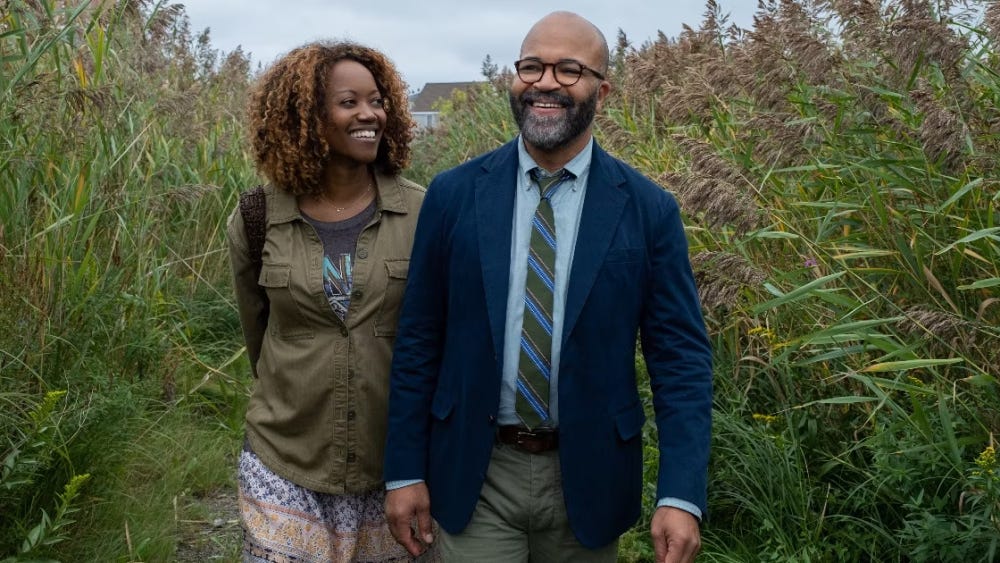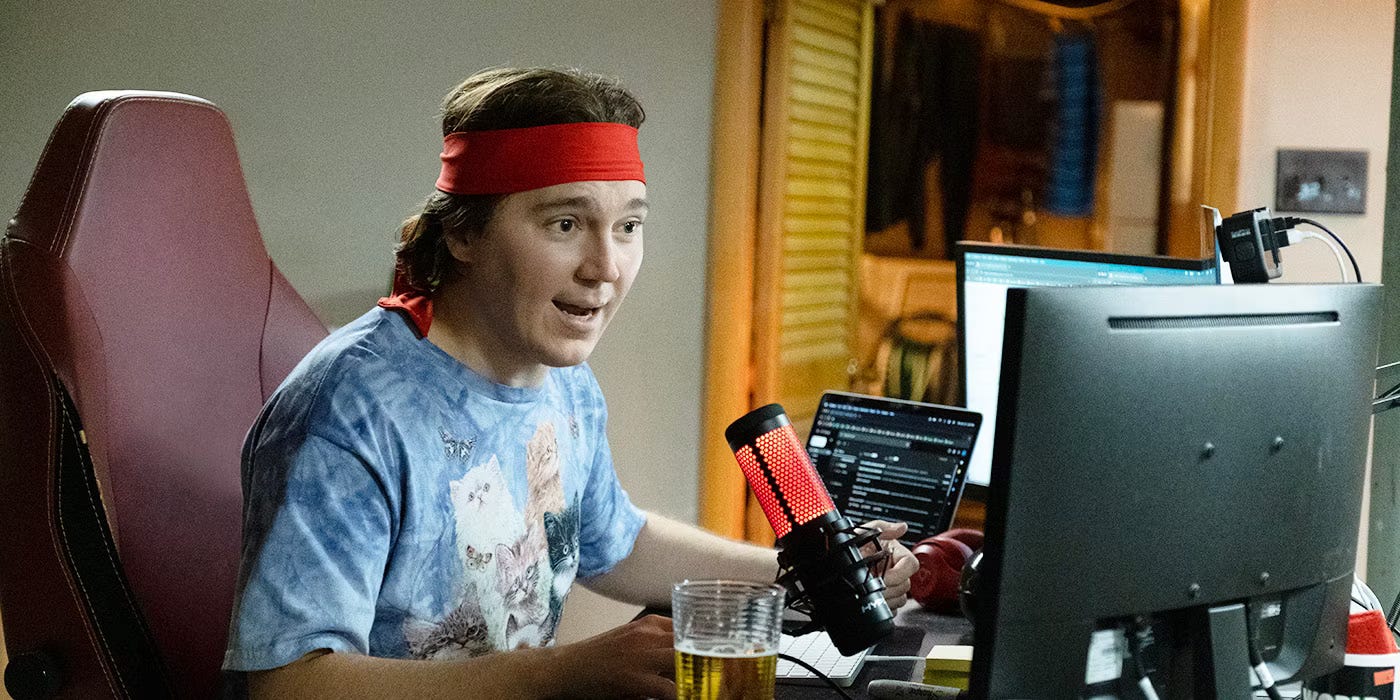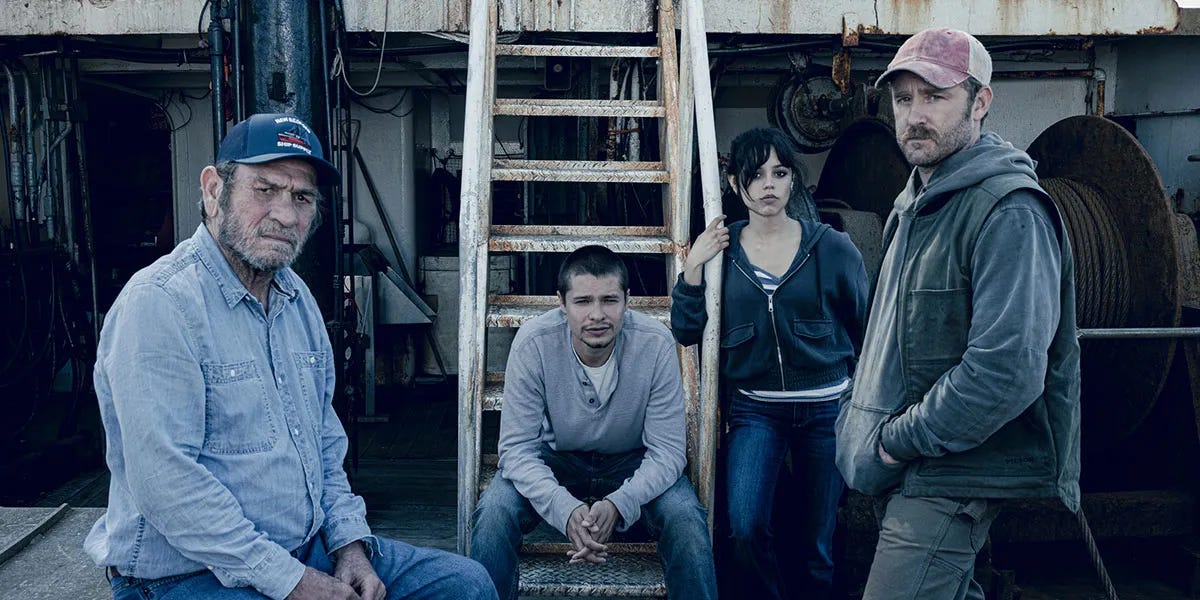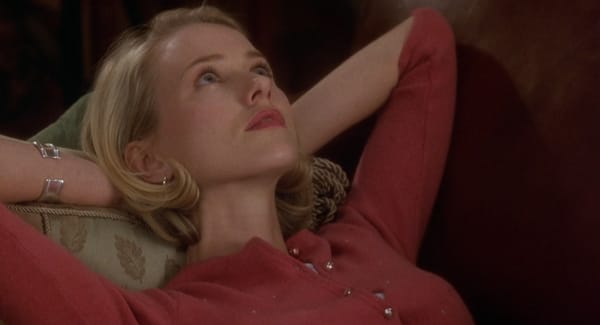Toronto Film Festival Report, Part I
"American Fiction," a new Miyazaki, and other bests of TIFF.

Is the Toronto International Film Festival in the middle an identity crisis? The crowds of industry and press professionals seem smaller than usual, the red carpet is empty of stars thanks to the SAG strike, and Bell, the festival’s major corporate sponsor of nearly three decades, announced that this would be its final year of involvement with TIFF. What that means for 2024 is anyone’s guess, but shake-ups don’t have to be a bad thing as long as the movies are good. And so far, with one or two exceptions, the movies have been good. Here are highlights from the first three days, most of which will be coming to a theater near you in the next three months.

“American Fiction” (⭐ ⭐ ⭐ 1/2) -- A wicked social satire of race, literature, and the craving for bogus “authenticity” that manages to be both broad and sharp and that gives a plum role to the great Jeffrey Wright (above right) as Thelonious “Monk” Ellison, a persnickety novelist outraged by the popularity of “Black trauma porn” with white readers and really steamed that his own new manuscript isn’t deemed “Black enough” by publishers. So he writes a fake ‘hood novel called “My Pafology” – it later gets changed to something more, uh, direct – and despairs as a bidding war erupts. First-time film director Cord Jefferson shows his TV drama roots but manages to negotiate a devilishly tricky mixture of tones by keeping the comedy grounded while honoring the tragic moments without letting them swamp the ship. A good ensemble cast helps: Sterling K. Brown, hilarious and painful as Monk’s dyspeptic brother; Tracee Ellis Ross as his sister; Leslie Uggams as a mother sliding into dementia; Issa Rae as a rival writer; and Erika Alexander (above left), warm and wise as the hero’s new romantic interest. Based on Percival Everett’s 2001 novel “Erasure,” with dialogue that crackles and bites. Biggest problem: a meta-ending that doesn’t quite work. Also: It’s a great movie to see with a crowd, but you’re forgiven for wondering whether a largely white Toronto crowd laughing so freely at being skewered is a sign of the film’s success or possibly its failure. (In theaters November 17.)

“Anatomy of a Fall” (⭐ ⭐ ⭐ ⭐) – There are worse ways to start a film festival by going to a movie that took the prize at a different film festival. Cannes Palme d’Or winner “Anatomy,” directed and co-written by France’s Justine Triet (and a big step up from 2019’s “Sibyl”), is on the surface a straightforward courtroom murder-mystery. Did novelist Sandra Voyter (Sandra Hüller, “Toni Erdmann”) push her husband (Samuel Theis) to his death from a window, or did he fall by accident or intent? Like “Saint Omer” earlier this year, the movie uses the bones of a judicial procedural to go deeper into the enigma of human motives and relationships – through cross examinations and flashbacks, the movie assembles a kind of “Scenes From a Marriage” in which both sides are allowed to have their say while allowing us to see how the decks of justice, public narrative, and private partnership can be stacked against a woman. The movie’s ending is not what I thought I wanted, but the more it steeps in my memory, the more I think it’s the one that works. Hüller’s performance has the scope of Greek drama, and there’s an astonishing argument in the couple’s kitchen that is a miniature epic of its own, but “Anatomy” is nearly stolen by Milo Machado Graner as the couple’s 12-year-old son, blind after an accident in early childhood but straining, like us, to see a truth that isn’t so easily glimpsed. (In theaters September 22.)

“The Boy and The Heron” (⭐ ⭐ ⭐ ⭐) – I wasn’t sure Hayao Miyazaki had it in him – another animated masterpiece on par with his best work: “Spirited Away,” “Princess Mononoke,” and the gentle, eternal “My Neighbor Totoro.” In war-time Japan, a young boy named Mahito, mourning the death of his mother, moves from Tokyo to the country and plunges down a rabbit hole in which his grappling with sorrow gradually acquires cosmic overtones. An impossible movie to describe – how do I explain the castle of giant man-eating parakeets? The demon gnome in a heron outfit? The adorable little blobs called Warawaras? – other than to say that it is pure, uncut Miyazaki, a cross between Lewis Carroll with teeth, Sigmund Freud, and a lysergic Japanese woodcut. “The Boy and the Heron” is beautiful and strange, the way all movies should be and precious few are. If it’s the master’s final work, it’s a glorious capstone; if he has one more in him — well, we should be so lucky. (In US theaters December 8.)

“Dumb Money” (⭐ ⭐ ⭐ 1/2) – One of the better entries to date in the true-story big-business comedy-drama-suspense genre – maybe we should call them bizcoms? It’s the story of how a Brockton, MA, nobody named Keith Gill (Paul Dano, above) – a day trader broadcasting from his basement under the nom du YouTube Roaring Kitty – bid up a losing stock called GameStop in the early days of the pandemic until he’d started a war of the little guys against the fat cat short sellers and hedge fund managers. Pretty irresistible, and director Craig Gillespie (“I, Tonya”) keeps it hopping from Gill and his incredibly patient wife (Shailene Woodley) to representative small-time investors saddled with debt: Nurse America Ferrara, college students Talia Ryder and Myha’la, lowly GameStop clerk Anthony Ramos. Seth Rogen, Vincent D’Onofrio, and Nick Offerman play the fat cats, and Pete Davidson is genuinely funny as the hero’s loser brother. This kind of thing can turn over-busy and smug (see: The films of Adam McKay), but Gillespie and company keep it all on the right side of antic. One question: Why does the movie’s Keith Gill never hire a lawyer? (In theaters September 29.)

“Finestkind” (⭐ ⭐) I have seen three movies at this year’s TIFF set in Massachusetts, and I am pleased to report that the current approach to The Accent is refreshingly sane: Either do it lightly or not at all. Erika Alexander in “American Fiction” wins the prize so far simply by pronouncing the town of Quincy correctly – “Quinzee” – and Tommy Lee Jones in “Finestkind” wins the Couldn’t Give a Shit Award by playing a grizzled New Bedford fisherman with his own Texas drawl, thereby forcing the screenwriters to come up with a convincing backstory for his character. The movie, I’m less pleased to report, is a well-intentioned mishmash of several different genres: A gritty working-class drama of family tensions, a surprisingly authentic docudrama of the New England fisheries, and, too late in the day, a crime drama with betrayals and backstabbings a-plenty and a villain played (quite well) by Clayne Crawford, who I guess is the Affleck you hire if you can’t hire an actual Affleck. Still, you have the always intense Ben Foster as the captain of a hard-luck fishing crew and Jones as his estranged father – every time either man is onscreen, you’re watching a real movie. But you also have a colorless Toby Wallace as the hero, Foster’s kid brother – headed to B.U. Law, don’t you know, but wanting to get his hands callused on a scallop boat first – and Jenna Ortega (TV’s “Wednesday”), who’s very likable but doesn’t yet have the emotional miles or acting skills to play a convincing New Bedford part-time heroin dealer. (But props to Rebecca Gilel as Ortega’s mother, who looks like she came to the set straight from a Fall River meth house.) The big oddity is a script that doesn’t know when to stop talking from writer-director Brian Helgeland, who won an Oscar for writing “L.A. Confidential” back in 1997. (No release date set, but Paramount+ has rights, so it may go straight to streaming.)

“North Star” (⭐ ⭐) – A disappointment from first-time director Kristin Scott Thomas, lacking the astringency and wit the actress has brought to her best performances. But it’s based closely on aspects of her own life, so distance may have been hard to come by. She plays a free-spirited woman marrying for the third time, which sends her three daughters – Royal Navy captain Scarlett Johansson, movie star Sienna Miller, and nurse Emily Beecham – into a tizzy. It's earnest and overwritten, sweet and sappy, with lovely gardens and a weirdly miscast Johansson. (Seeking distribution.)

It hit me watching “The Promised Land” (⭐ ⭐ ⭐ 1/2) that Mads Mikkelson may be our Gary Cooper – a fabulous minimalist whose granitic face hardly ever seems to move yet who’s able to convey vast gradations and depths of feeling. The film itself is a richly pleasing old-fashioned barnstormer set in 18th century Denmark, with Mikkelsen stoic and heroic as a common man determined to build a settlement on the blasted heaths of Jutland and Simon Bennebjerg deliciously hateful as a sadistic noble equally determined to stop him. Directed by Nikolaj Arcel and shot with the sweep of a historical epic by Rasmus Vidbæk, it has nimble performances by Amanda Collin as the hero’s initially reluctant pioneer partner, Kristine Kujath Thorp as the local hot-to-trot princess, and a gallery of settlers, nobles, and civil servants who could have stepped out of a Dutch masters painting. Proof that, when all is said and done, they still make ‘em like D.W. Griffith (just minus the racism), “Promised Land” doesn’t break any new ground but replows the old ground with style, muscle, and class. The film’s Danish title is “Bastarden” – “Bastards.” They should have kept it. (No release date set.)
Comments? Please don’t hesitate to weigh in.
If you enjoyed this edition of Ty Burr’s Watch List, feel free to pass it along to others.
If you’re not a paying subscriber and would like to sign up for additional postings and to join the discussions — or just help underwrite this enterprise, for which the author would be eternally grateful — here’s how.
You can give a paid Watch List gift subscription to your movie-mad friends —
Or refer friends to the Watch List and get credit for new subscribers. When you use the referral link below, or the “Share” button on any post, you'll:
- Get a 1 month comp for 3 referrals
- Get a 3 month comp for 5 referrals
- Get a 6 month comp for 25 referrals. Simply send the link in a text, email, or share it on social media with friends.
There’s a leaderboard where you can track your shares. To learn more, check out Substack’s FAQ.





